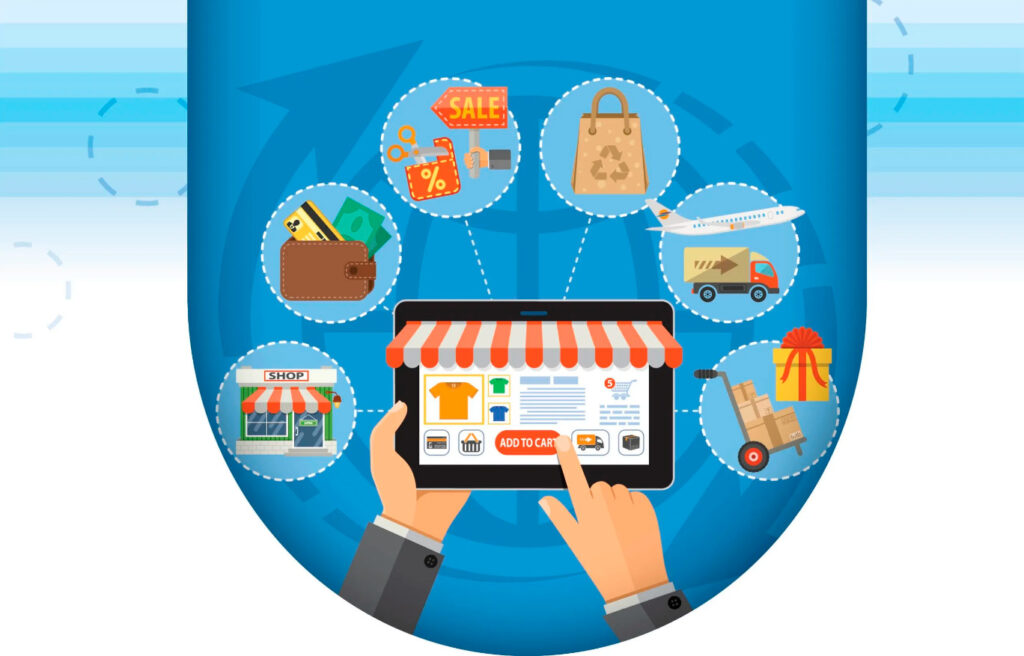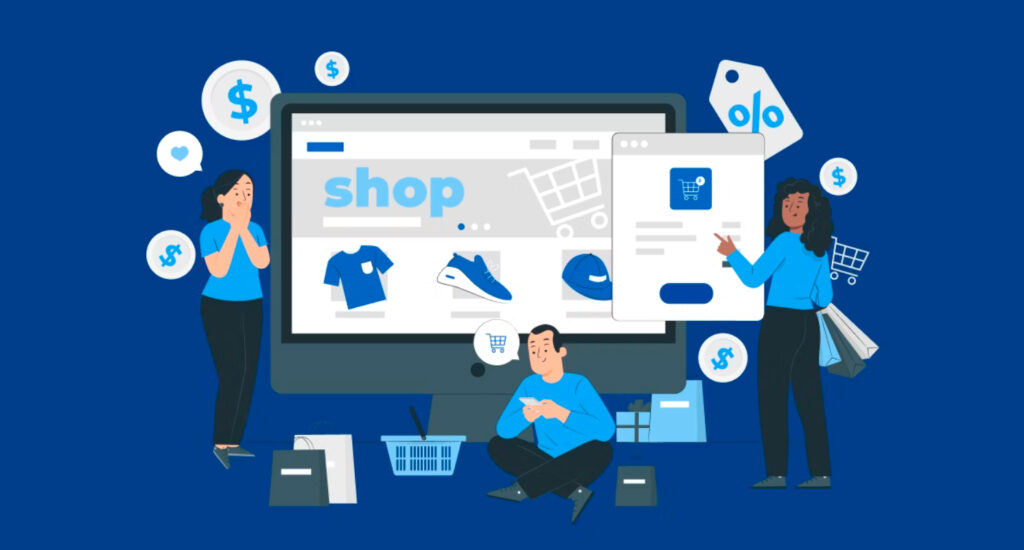Ecommerce for Small Business
In today’s business landscape, active online participation is essential, and small organizations, companies, and enterprises must stay ahead to compete in the ecommerce niche. Choosing the right software for an online store for a small brand is considered a key factor for a successful online presence. To thrive, small businesses should select tools, technologies, and web development with unique individual needs and budgets to bring business ideas to life.

Introduction to Ecommerce for Small Businesses
Starting with the e-commerce business it is the fastest-growing segment of commerce worldwide. It continues to evolve rapidly in all countries, opening up new product and service realization prospects. Launching an online store or social media presence is a challenging task.
Small businesses are the backbone of the economy, and eCommerce is their gateway to the world.
Ensuring success for small business ecommerce is even more difficult. In the highly competitive Internet marketing world, any enterprise must address numerous tasks and focus on sound strategies that aid in flourishing. All ecommerce platforms know the challenges of attracting organic (customer) traffic and increasing online sales in a crowded business space.
What is Ecommerce?
To most ordinary people, ecommerce is the online purchase or sale conducted remotely “online.” It’s not just financial or trade transactions through online stores or social media pages. It’s a chain of evolving global business processes related to financial transactions. In simple terms, e-commerce businesses are rapidly advancing in the digital economy due to the explosive growth of social media channels, technologies, tools, and trends over the past decade.
Importance of Ecommerce for Small Businesses
The concept of ecommerce is closely linked to the term ecommerce business. The importance of e-commerce websites for small companies is enormous because they offer the opportunity to expand, progress, earn, and become more successful, customer-centric, and competitive. E-commerce through online stores or social ecommerce platforms offers unprecedented opportunities for every startup. Various internet uses include advertising, generating, and promoting small business online marketing in the network using multiple technologies, trends, online channels, and tools.
Benefits of Establishing an Online Presence
Every ecommerce business understands that ecommerce platforms are primarily an opportunity to represent any manufacturer and what they produce in the best light. If starting an ecommerce business, it’s sufficient to begin using various innovative channels and technologies to expand one’s sphere of influence, including increasing online presence on the internet. Using business-centric online marketing also allows brands to expand their customer base significantly and increase their profits. When a business model and marketing tools for promotion are wisely chosen, brand recognition and online presence increase without significant additional time and financial investments.
Getting Started with Ecommerce
Many people wonder how to start a new business online. Firstly, you need relevant business ideas that are unique and have other advantageous features. Secondly, selecting a business model is essential to understand how to promote the e-commerce business further. Thirdly, you must create your ecommerce website and pages on one or multiple social platforms. Fourthly, you need to fully understand your ecommerce niche, knowing what products your brand will sell and what your business will focus on. Fifthly, it’s crucial to hire a professional team of marketing specialists who are willing to take on the project of promoting a specific small business ecommerce.

Choosing the Right Ecommerce Platform
For any ecommerce business, carefully choosing one of the thousands of ecommerce platforms available is essential. Based on the selected platform, ecommerce websites for smaller companies will be developed. The platform should be highly mobile-friendly regardless of the operating system, fully scalable, SEO-friendly, and reasonably priced, among other factors. It’s best to choose one of the popular platforms currently available.
Setting Up Your Online Store
Every ecommerce business has its web presence. Therefore, the priority is to set up an ecommerce store where the brand will sell products to online customers. Setting up involves a series of internal web page optimization actions for search engine promotion. Essentially, specialists perform a series of actions on pages (for example, implement well-selected keywords, develop unique content, etc.) that subsequently help regular online users find the ecommerce store in various search engines through a unique search bar.
Integrating Payment Gateways
Implementing technological solutions for each e-commerce business will allow for real-time electronic transactions and payments, processing credit cards, and other payment methods. Integrating payment gateways enables ecommerce businesses to accept payment on their websites or web applications, minimizing user transitions and simplifying the payment process. This significantly increases convenience for customers and contributes to increased conversion. Integration also provides security and protection of customers’ financial data for every small business ecommerce because processing occurs through secure connections.
Designing a User-Friendly Website
The most correct and promising ecommerce business ideas involve choosing competent ecommerce platforms for small retailers for further promotion and paying particular attention to website design. An intuitive interface for the ecommerce website should be the primary focus because it determines how long a potential customer will stay on the website, whether they will make an online purchase, and whether they will be satisfied after using the site or application. The website design for small businesses should be such that customers come back repeatedly.
Strategies for Small Business Ecommerce Success
If you understand how to start a new business online, the next step is determining which promotion strategies for small businesses work in practice. It is known that all action plans start with ecommerce business ideas. This is followed by the stage of creating and developing each point. Typically, small business owners are focused on creating a natural and working, efficient and successful, competent and qualified strategy that will help them reach the top leadership level. Naturally, the strategies also outline which ecommerce platforms for small businesses will be used, what tools and technologies will be applied, and what step-by-step actions will be taken and how frequently.

Identifying Your Target Audience
For all ecommerce businesses, it is necessary to start by defining their target audience. All selling online companies must understand who the end consumer of the product or service is, that is, their target audience. If you accurately identify your customers and direct maximum efforts to attract them, you can achieve maximum results in continually increasing revenues for small business e-commerce. The target audience is a group of people who may be interested in the product or service and who can purchase it.
Creating Compelling Product Listings
All business owners must determine what they will offer to their customers. The best solution would be to create specific lists, such as smart home products or any other products the brand will trade. It’s better to take care of e-commerce business ideas early or during brand creation for registration. Suppose we’re talking about smart home products. In that case, the list should include components of a smart home system, automatic lighting, the ability to control household appliances (vacuum cleaner, boiler, kettle, etc.) via smartphone, and so on.
Implementing Effective Marketing Techniques
Competent and well-thought-out, transparent and structured, optimization-focused ecommerce solutions for businesses of any size should be built based on popular innovative trends. A good solution for all online companies would be to implement SEO tools, advertising campaigns, online channels, creative methods of promoting websites and applications, and so on. All business owners can include a full range of online promotion measures in their strategy. Still, the main thing is having enough financial resources and a dedicated budget.
Optimizing for Search Engines (SEO)
Indeed, all business owners have heard of SEO technologies, optimization, and promotion. Such ecommerce solutions for a new business should be prioritized and included in one of the strategies. Implementing various types of SEO will allow for profitable ecommerce business upon completion. SEO tools increase conversion, traffic, and regular online sales from the promoted website. The essence is that optimization has a long-term effect. So, after the project is completed, the business can enjoy digital sales and regular profit growth for a long time.
How Small Ecommerce Businesses Can Compete with Larger Ones
It can be difficult for small businesses to compete with large companies in the modern market. In many respects, they have an advantage regarding comfort, recognition, reputation, authority, and price. They have larger advertising budgets and the financial resources to offer free shipping, implement customer promo codes, etc. However, small companies can still compete with large brands through marketing technologies that will help attract attention to themselves.

Specialization and Niche Targeting
Specializing in targeted marketing is an innovative and fitting decision. The niche targeting and its direct launch present an excellent opportunity to focus on a specific target audience, launch targeted advertising to particular products or services based on conducted analytics, and attract traffic through advertising campaigns tailored for your brand.
- Focus on a Specific E-commerce Niche
Focusing on highly individual consumer needs, requests that require a specific set of complementary products (goods or services), a small and stable market potential, and significant competition weakening can lead to success when launching targeting.
- Offer Unique Value Propositions
Creating unique offers should be based on your capabilities and the interests of your target audience. You can constantly offer customers more than competitors while benefiting your business. Developing an intelligent value proposition that interests modern consumers and is feasible for a small enterprise to deliver is crucial.
Customer-Centric Approach
Customer-centricity involves promptly identifying your target audience’s needs and potential customers’ desires to satisfy them with maximum benefit. Ideally, this approach exceeds expectations and genuinely evokes delight. This approach is an excellent alternative to others because it starts with customers’ desires.
- Build Personalized Relationships
Every small organization’s task is to give customers what satisfies their desires. This is building a personalized approach. The main rule is not to orient the business towards other people’s customers but to differentiate healthy customer-centricity. That is, if a brand promotes a specific niche, it’s essential to offer products that are personalized to that niche.
- Utilize Customer Feedback
Positive reviews and good comments from regular customers or clients who purchased a product or used a service for the first time are excellent starting points for building good relationships with your target audience. People tend to read everything others write about a company and then decide whether or not to make purchases here.
Innovation and Adaptability
Preserving the business and ensuring its value growth is the main task that should be on the agenda for all brand owners. This implies searching for growth points through innovative trends, modern methodologies, online channels, solutions, and tools that, when used, yield excellent results. Adapting a small business to the modern world of the Internet and technology is a good and correct idea, which is essential for everyone who wants to become a market leader.

- Embrace Agility in E-commerce Operations
Agility in e-commerce operations means looking at your brand from a different angle. It’s essential to look through the lens of customers’ pains and problems and understand how exactly a specific business can help solve them. If a brand offers some substitutes, it’s likely to succeed in the modern market much sooner.
- Invest in E-commerce Technology
Investing in modern technologies and marketing tools, various effective advertising campaigns, and innovative trends is the first step toward maximizing a small company. It’s important to wisely allocate the budget from the beginning and allocate funds for effective promotion, promotion, and business optimization.
Cost Efficiency and Lean Operations
Economic efficiency is the result achieved by measuring the profitability indicators of small-scale production relative to total costs and financial resources used. Operational thriftiness involves judicious budget allocation to business projects and wise investment in the right technologies, tools, and promotion methodologies per the brand’s goals and objectives.
- Manage Costs Effectively in E-commerce
Creating a clear action plan and an efficient strategy is essential to manage your small enterprise’s expenses effectively. Suppose each aspect is adequately outlined and the approach is entirely successful, meeting the business’s needs. In that case, the economic impact will be observed in increased profits rather than when the enterprise incurs losses. For this, it’s essential to ensure prudent management of financial resources and their quality distribution.
- Implement Lean Practices in E-commerce
Focusing on economic efficiency, which involves obtaining more production results from the small company’s available resources, thus justifying the costs of acquiring resources, etc., makes it possible to allocate the budget correctly and use it maximally, loyally, and thriftily. Sound practices for managing financial resources in the business project must be implemented to achieve this.
Digital Marketing and Online Presence
The contemporary digital era is closely linked to strong brand presence on the Internet and holds decisive importance for them. The essence lies in the fact that online marketing has become an integral part of a successful strategy, enabling small organizations to reach the maximum necessary audience and engage with consumers. By utilizing digital marketing, it’s possible to positively influence the brand’s online presence on the World Wide Web.
- Harness the Power of Digital Channels in E-commerce
Internet marketing encompasses a range of strategies, solutions, and tactics for promoting specific products and services through online channels. Proper use of online marketing tools will enhance a business’s authority. It allows business websites to increase their rankings in search engines, rise in Google’s top 10, and become as famous, popular, and relevant as possible.
- Utilize E-commerce Platforms
Leveraging specialized platforms can significantly simplify elevating a brand to the top of various search engines, including Google. To achieve this, it’s sufficient to conduct website analytics for the business, understand its needs, outline goals and objectives, and devise a marketing strategy accordingly. Following the action plan and selecting the right platform can propel the brand to the top ranks.
Tools and Resources for Small Business Ecommerce
Tools and resources for ecommerce are specific elements or parts related to web resources, applications, plugins, etc., that assist small brand owners in managing their online stores. There are many types of them, but they all share the common goal of simplifying, organizing, and automating business processes and managing and developing ecommerce websites.

Ecommerce Platforms and Tools
The digital revolution enables businesses to shift sales online. Therefore, platforms are necessary to manage a brand’s web resources conveniently. Each platform and its tools are unique. Choosing a platform should consider the specifics of online business, its essential tasks, and goals. Different platforms may suit different small enterprises that vary in niches.
Marketing Automation Software
Marketing automation software optimizes marketing decision-making processes used in online marketing campaigns. This includes managing campaigns, audience segmentation, behavioral analysis, website monitoring, and assessing potential customers. Automation saves time, reduces errors caused by human factors, and enables achieving higher results.
Customer Relationship Management (CRM) Systems
CRM systems help gather data from various communication channels, including a small company’s website, phone, email, chat, marketing materials, and social platforms. Small businesses can learn more about their target audience and how best to satisfy their needs, thereby retaining customers and stimulating sales growth. Therefore, their use is necessary.
Shopify
This platform is considered a one-stop shop for all ecommerce needs through various instruments and services that simplify retailing online and enhance customer service. Shopify is a worthwhile investment for any online business searching for an easy-to-use, scalable ecommerce platform. The company provides modern, customizable themes and a simplified set of critical sales tools with integrations that could make managing sales easier. It can be integrated with Google Ads, allowing you to effortlessly deploy and handle PPC advertising campaigns directly from the store.
BigCommerce
On the other hand, that company suggests an optimal platform alternative for any retailing business since it entails user-friendly design, feature-rich price options, and doesn’t charge fees. It proposes complete instruments for marketing, analytics, and design that make the platform suitable for enterprises of any size. The platform features more built-in functions targeted exclusively for B2B ecommerce than the first one, but Shopify converts better than BigCommerce. On average, its checkout process has a 12% higher conversion rate.
Wix
Having this provider behind your store, you could employ advanced SEO features to automate and scale optimization for web pages. With a Wix website, you can launch an effective email marketing campaign to engage the target audience and improve website traffic. The tool could also be directly integrated with Google Ads, enabling you to manage your ad campaigns from your dashboard. Through its marketing tools, you can connect with those who already want to buy — any business may improve conversions by building customer relations with a clear marketing suite.
WooCommerce
Relying on the tool provided by WordPress, you’ll ensure that you have established the foundation for long-term marketing activity. WooCommerce allows you to grant discounts to promote your store; it also has built-in analytics, which provides insights into your online store’s key metrics, such as average order values, total sales, and products sold. With autonomous marketing features, you may get leads, retain customers, and advance customer service. Features like welcome emails, automated triggers, and ad campaigns cover all the necessary features to help you increase profits.
Future Trends in Small Business Ecommerce
Understanding the current situation in the modern market is the basis for building a future strategy. Contemporary and innovative trends demonstrate that sales growth dynamics are consistently increasing, so businesses must enter the online space. Using fantastic and practical solutions, original online channels, unique promotion and optimization methodologies, and tactics and practices that work in practice make it possible to become top leaders, maintain a good reputation and authority, increase popularity and recognition, and increase online visibility in the network.

FAQ
What is a small Ecommerce business?
Small ecommerce businesses are those directly involved in buying and selling goods and services online. Essentially, it’s quite straightforward — customers can make purchases in real time from their laptops, smartphones, other devices and gadgets, and other interaction points. They can also place orders, communicate with customer support, conduct financial transactions, and make payments, among other things.
Is Ecommerce good for small businesses?
Naturally, ecommerce is suitable for all types of businesses. The rapid growth of the internet commerce market makes tools and marketing technologies increasingly essential, especially for promotion, popularization, development, updating, and optimization. Moreover, digital business transformation always attracts a maximum number of customers, boosting small companies’ profits.
What Ecommerce platform is best for a small business?
Every brand owner should focus on choosing the right platform. It’s better to select the option that offers comprehensive solutions for scaling the brand with various advanced marketing options and features. Essentially, the more of these options, the better for the brand, so looking for a platform with a concise nature, good functionality, and reasonable, adequate pricing is worth it.





